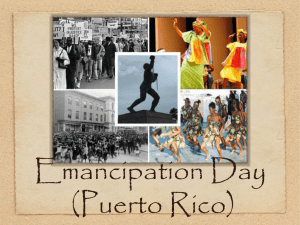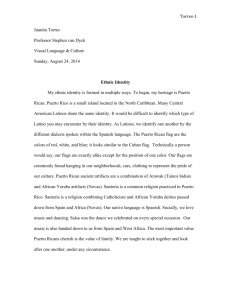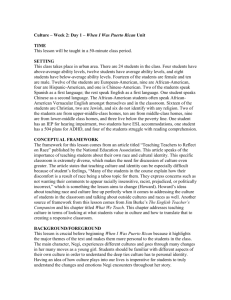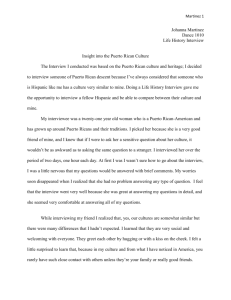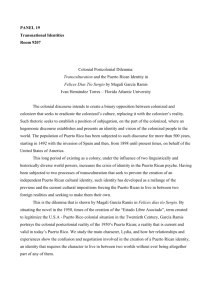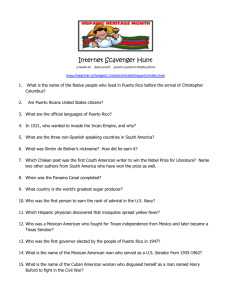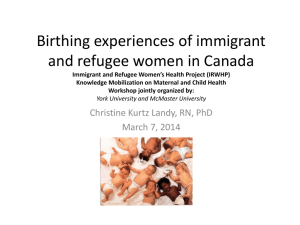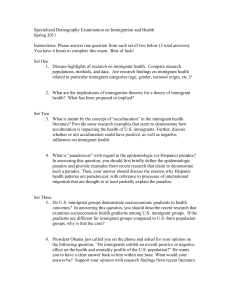Strategies for Puerto Ricans Parent Involvement Language and
advertisement
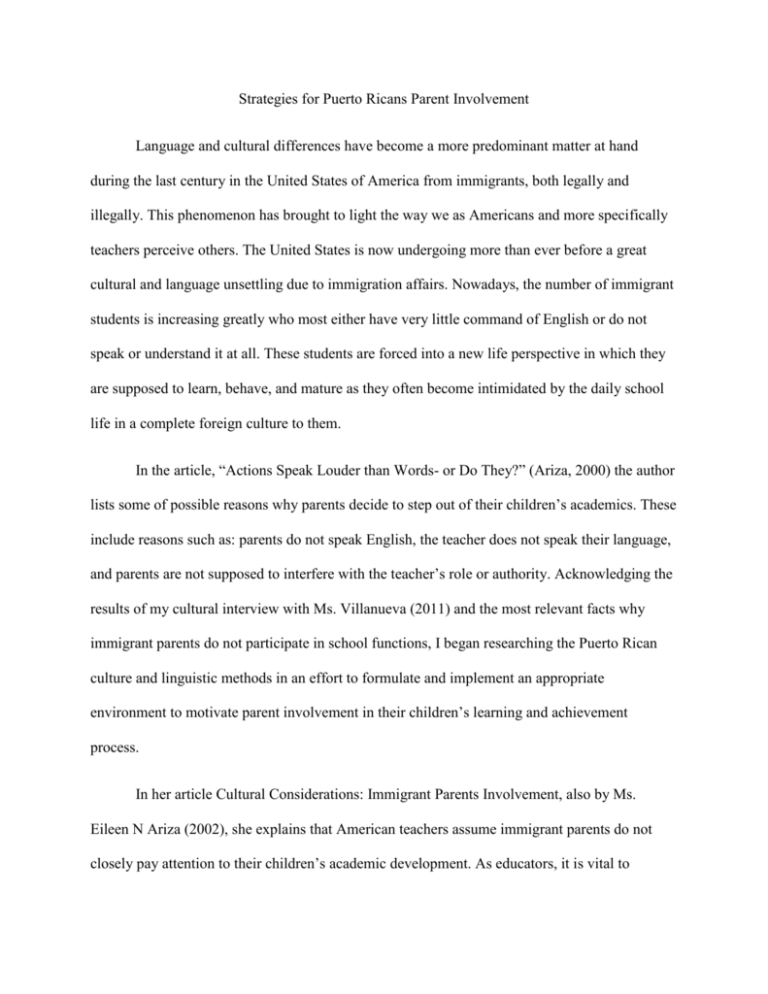
Strategies for Puerto Ricans Parent Involvement Language and cultural differences have become a more predominant matter at hand during the last century in the United States of America from immigrants, both legally and illegally. This phenomenon has brought to light the way we as Americans and more specifically teachers perceive others. The United States is now undergoing more than ever before a great cultural and language unsettling due to immigration affairs. Nowadays, the number of immigrant students is increasing greatly who most either have very little command of English or do not speak or understand it at all. These students are forced into a new life perspective in which they are supposed to learn, behave, and mature as they often become intimidated by the daily school life in a complete foreign culture to them. In the article, “Actions Speak Louder than Words- or Do They?” (Ariza, 2000) the author lists some of possible reasons why parents decide to step out of their children’s academics. These include reasons such as: parents do not speak English, the teacher does not speak their language, and parents are not supposed to interfere with the teacher’s role or authority. Acknowledging the results of my cultural interview with Ms. Villanueva (2011) and the most relevant facts why immigrant parents do not participate in school functions, I began researching the Puerto Rican culture and linguistic methods in an effort to formulate and implement an appropriate environment to motivate parent involvement in their children’s learning and achievement process. In her article Cultural Considerations: Immigrant Parents Involvement, also by Ms. Eileen N Ariza (2002), she explains that American teachers assume immigrant parents do not closely pay attention to their children’s academic development. As educators, it is vital to understand the “why” this is happening. One of the most prevalent concepts based on the preconceived idea that immigrant parents’ absence in mentoring their children’s formal education is rooted in the fact that the parents themselves have either partial or complete lack of command of the English language. Even though Puerto Rico is a territory of the United States of America, according to the website American Fact Finder ("Puerto Rico," 2008), the 2007 census reported that 95.2 percent of the population in Puerto Rico speak predominantly Spanish, making Spanish the official language of Puerto Rico. Needless to say, the linguistic background Puerto Ricans bring into the United States determines some of the drawbacks they will encounter, especially when parents attempt to engage in their offspring education. Teachers need to reevaluate their misconception regarding immigrant families, especially young school-aged children in an effort to make them feel more welcome in the school environment. The teacher has a vital role in the success of immigrant children and parents in their adaptation to the American school system and its own culture by being a proactive team member of professional and highly skilled school staff who is aware and progressive in orienting immigrant family members into the public school system seamlessly. Educators are the very first individuals to receive new immigrant student and parents and should have a positive foundation to build on their interaction with the children’s academic standing and learning process. As the United States of America has become more culturally diverse, it is important for educators to utilize as many ways as possible to build an alliance with the parents who are not literate in English. In the book Bridging Cultures between Home and School (Trumball, Rohstein-Fisch, Greenfield & Quiroz, 2001), the authors state “there is no universally successful way to involve parents”. This statement leads to a very interesting theory which denotes that we cannot expect to follow the same strict and out-of-date steps to communicate with parents without taking into consideration their cultural backgrounds. Bearing culture, ethnicity, and nationality, one of the driving factors parents do not participate or volunteer in school functions is due largely to the language barrier. Most nonAmerican parents take for granted that most of the teachers are Americans and do not speak the parents native tongue. Cultural and language contrast can be an unbreakable wall between parents and educators if teachers do not take further steps to communicate with non-speaking English parents. For instance, learning about the immigrant student, in the case of my interview Puerto Ricans, and consider learning queue phrases in Spanish might have an invaluable significance for Puerto Rican parents as they will sense their culture and language is valued and respected. Undoubtedly, teachers might not be able to uphold a conference in a foreign language without a bilingual assistant, but the teacher’s knowledge of a few basic phrases in the immigrant language will open one of the most important doors to integrate parents in the school settings. It will improve the teacher-student-parent rapport, and most significantly it will ensure immigrant students success academically. A more dynamic teacher might consider doing perhaps a one-time little research into where English as a Second Language (ESL) classes or courses are taught at various levels of competency in the community, both professionally and voluntarily based a list of resources to provide the parents an unknown opportunity to immerse themselves in the English language themselves such as the Literacy Services in Pinellas County or the Hillsborough Literacy Council to name a few. In taking into consideration the Puerto Rican cultural background, I need to highlight that Puerto Rican parents perceive teachers as the ultimate authority in the classroom and are highly respected in the community. Bearing in mind that concept, Puerto Rican culture does not consider it appropriate or necessary to interfere with the teachers’ role. As other Hispanic countries, Puerto Rican parents install in their children to respect teachers and undoubtedly acknowledge the supremacy of the teacher. Puerto Rican parents do not only place their children’s education in the teachers’ hands, but also recognize that teachers will play a secondparent role in their children’s life. One of the insights I acquired during my interviewing Ms. Villanueva is that Puerto Rican parents will extremely rarely if ever dare question or contradict any sort of punishment children receive due to misbehaving in an academic setting. While in the American culture, teachers are highly respected for the most part, I have found through experience and research that the majority of Americans do not idolize schoolteachers; consequently, they will inquire if not persist about the imparted educational knowledge in the classrooms if they feel there is some sort of inequality, injustice, or discrimination whether it is warranted or not, even though the parent has little to not the contribute to their children’s learning process. For the most part, I have observed many immigrant parents simply do not comprehend the American education system and educational laws as they are often minimally educated even by their home country standards. As stated in the article Parent Involvement in Children’s Education: Lesson from Three Immigrant Groups (Garcia, 2002) the participation of other members in the community should be used to provide knowledge of the important participation of parent involvement. Teachers should encourage the integration of the immigrant parents into the American educational environment by assisting immigrant parents to become knowledgeable about the limitless benefits the American educational system offers themselves and their children. Summarily, after researching the most prevalent issues why Puerto Ricans parents are reluctant to participate in their children’s educational pursuits, I have come to realize that American bilingual or non-bilingual teachers need to be mindful in terms on how to reach out to and interact with immigrant parents while awakening them to their invaluable contribution in their children success. Comprehending that Puerto Rican families have a passive role in the educational success of their children due to the lack of command of English, seeing teachers as supreme authority, and believing American teachers do not speak their language (Spanish), I propose an invitation should be sent to all parents to celebrate the National Hispanic Heritage Month, usually September 15 to October 15 each year, as part of the history curriculum. The basis of this social event is to let Puerto Rican families intermingle with the school community. Furthermore, I intend to emphasize the school appreciate and respect Hispanic culture and language by providing food, sodas, and music that identify with the entire Hispanic community, and as per my interview, more so involving the Puerto Rican culture. This experience will allow the teachers to serve as liaisons between parents and the school system and staff in a more cooperative environment as both parties should be in a more relaxed atmosphere facilitating an exchange of ideas and concepts to reinforce parent-teacher union in the children’s education, but the community itself. It should afford auspicious reciprocate with each one of the non-speaking English parents in their own language with the assistance of bilingual aids and other measures. This would also present a unique setting for me as my first language is Spanish. I strongly believe my Hispanic background will contribute positively in the development of my rapport with Puerto Rican and other Hispanic families. References Ariza, E. (2000). Actions speak louder than words-or do they? debunking the myth of apathetic immigrant parents in education. Contemporary Education, 71(3), 36-38. Ariza, E. (2002). Cultural considerations: immigrant parent involvement. Kappa Delta Pi Record, 38(3), 134-137. Garcia, C., Aikiba, D., Palacios, N., Bailey, B., & Silver, R. (2002). Parental involvement in children's education: lesson from three immigrant groups. Parenting, 2(3), 303-324. DOI: 10.1207/S15327922PAR0203_05 Trumball, E., Rohstein-Fisch, C., Greenfield, P., & Quiroz, B. (2001). Bridging cultures between home and school: a guide for teachers: with special focus on immigrants latino families . (p.33). Mahwah, NJ: Lawrence Erlbaum Associates, Inc.Retrieved from http://books.google.com/books?hl=en&lr=&id=kvRug49xws8C&oi=fnd&pg=PP1&dq=latino +parents+prevent+from+participating+in+school+functions&ots=F0dwZUef4J&sig=OuzJi_e 5LPKXM2CMeH1Hzlw7jAA#v=onepage&q&f=false U.S. Census Bureau. (2008). Puerto rico. WAshington, DC: Government Printing Office. Retrieved from http://factfinder.census.gov/servlet/STTable?_bm=y&-geo_id=04000US72&qr_name=ACS_2008_1YR_G00_S1601&-ds_name=ACS_2008_1YR_G00_&-_lang=en&redoLog=false Villanueva, C. (2011, September 03). Interview by M Desjardins Personal Interview]. Cultural interview. , Tampa, FL. Celebremos Todos Juntos el Mes de la Herencia Hispana
